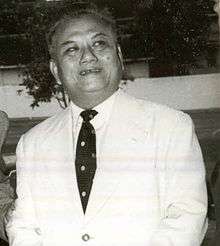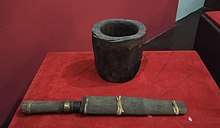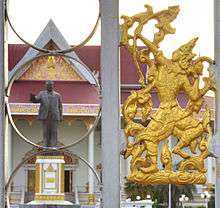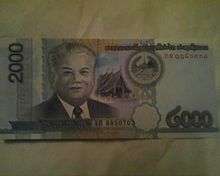Kaysone Phomvihane
Kaysone Phomvihane (Lao: ໄກສອນ ພົມວິຫານ) (13 December 1920 – 21 November 1992) was the first leader of the Lao People's Revolutionary Party from 1955 until his death in 1992. He also served as the first Prime Minister of the Lao People's Democratic Republic from 1975 to 1991 and then as the second President from 1991 to 1992.
Kaysone Phomvihane | |
|---|---|
ໄກສອນ ພົມວິຫານ | |
 | |
| 1st Chairman of the Central Committee of the Lao People's Revolutionary Party | |
| In office 22 March 1955 – 21 November 1992 | |
| Succeeded by | Khamtai Siphandon |
| 2nd President of Laos | |
| In office 15 August 1991 – 21 November 1992 | |
| Prime Minister | Khamtai Siphandon |
| Preceded by | Phoumi Vongvichit (Acting) |
| Succeeded by | Nouhak Phoumsavanh |
| 11th Prime Minister of Laos | |
| In office 8 December 1975 – 15 August 1991 | |
| President | Souphanouvong Phoumi Vongvichit (Acting) |
| Preceded by | Souvanna Phouma |
| Succeeded by | Khamtai Siphandon |
| Personal details | |
| Born | 13 December 1920 Savannakhet, French Indochina |
| Died | 21 November 1992 (aged 71) Vientiane, Laos |
| Political party | Lao People's Revolutionary Party |
Biography
Kaysone was born Nguyen Cai Song[1] to a Vietnamese father named Nguyen Tri Loan, and a Lao mother named Nang Dok. He had two sisters: Nang Souvanthong, living in Thailand and Nang Kongmany in the USA.[2] He was born in Na Seng village, Khanthabouli district (now Kaysone Phomvihane District, Savannakhet Province), Laos.
Kaysone attended law school at University of Indochina in Hanoi, Vietnam, with Nouhak Phoumsavan. He dropped out of law school to fight the French colonialists who were in Vietnam. Later, he joined the Pathet Lao movement, which was also fighting the French colonialists.

He became an active revolutionary while studying in the Indochinese capital of Hanoi (now the capital of Vietnam) during the 1940s. The Lao People's Liberation Army (LPLA) was established by Kaysone Phomvihane on January 20, 1949. He was minister of defence of Resistance Government (of the Neo Lao Issara) from 1950. In 1955 he was instrumental in setting up the LPRP at Sam Neua in northern Laos, and subsequently served as the Pathet Lao leader, with Souphanouvong as its figurehead. In the years which followed, he led communist forces against the Kingdom of Laos and U.S. forces. After their victory he served as Prime Minister from the founding of the Lao PDR in 1975 until 1991 and later President until his death in 1992. He married Thongvinh Phomvihane.
Kaysone displayed expert skills in handling relations with Vietnam. The demarcation process started in 1977 and finished in 2007. According to western journalist the Lao/Viet borderline is "very close" to the 1945 border between Laos and Tonkin and Annam, respectively.
According to Vatthana Pholsena, assistant professor of Southeast Asian Studies at the National University of Singapore and author of the book "Post-war Laos", Kaysone Phomvihane was the top policy maker in LPDR, and a strongman. He created Sekong Province to honour the southern minority for their support in the war effort.

Kaysone died in Laos's capital, Vientiane. After Kaysone's death, the government of Laos built a museum in Kaysone's honour, in Vientiane, partially funded by Vietnam.[3]
In 2012 his cremated ashes were transferred from their original resting place to the newly built National Cemetery.[4]

Family
His younger son, Sanyahak Phomvihane, was elected to the LPRP Central Committee at the 8th LPRP Congress and became a Major General at the age of 40 in 2008. However, he suffered an early death, at the age of 45, on 19 July 2013.[5] His elder son, Xaysomphone Phomvihane (born 10 October 1954) currently serves as President of the Lao Front for National Construction. His other son, Santiphap Phomvihane currently serves as Governor of Savannakhet Province.
Foreign honours

See also
References
- Asia & Pacific Review. Published by World of Information, 1994, ISBN 0-7494-1069-8, pg 117
- Arthur J. Dommen, The Indochinese Experience of the French and the Americans: Nationalism and Communism in Cambodia, Laos, and Vietnam, Indiana University Press, 2001, ISBN 0-253-33854-9, pg 181
- "Former President Kaysone Phomvihane Memorial Museum". Visiting Arts, Laos Cultural Profile. Archived from the original on December 25, 2007. Retrieved 2007-09-10.
- https://www.newmandala.org/revolutionary-remains/
- Limited, Bangkok Post Public Company. "Rising Laos political star dies". Retrieved 28 July 2018.
| Political offices | ||
|---|---|---|
| Preceded by Souvanna Phouma |
Prime Minister of Laos 1975–1991 |
Succeeded by Khamtai Siphandon |
| Preceded by Phoumi Vongvichit (as Acting President) |
President of Laos 1991–1992 |
Succeeded by Nouhak Phoumsavanh |
| Party political offices | ||
| Preceded by None |
General Secretary of the Lao People's Revolutionary Party 1955–1991 |
Succeeded by Himself (as Chairman) |
| Preceded by Himself (as General Secretary) |
Chairman of the Lao People's Revolutionary Party 1991–1992 |
Succeeded by Khamtai Siphandon |